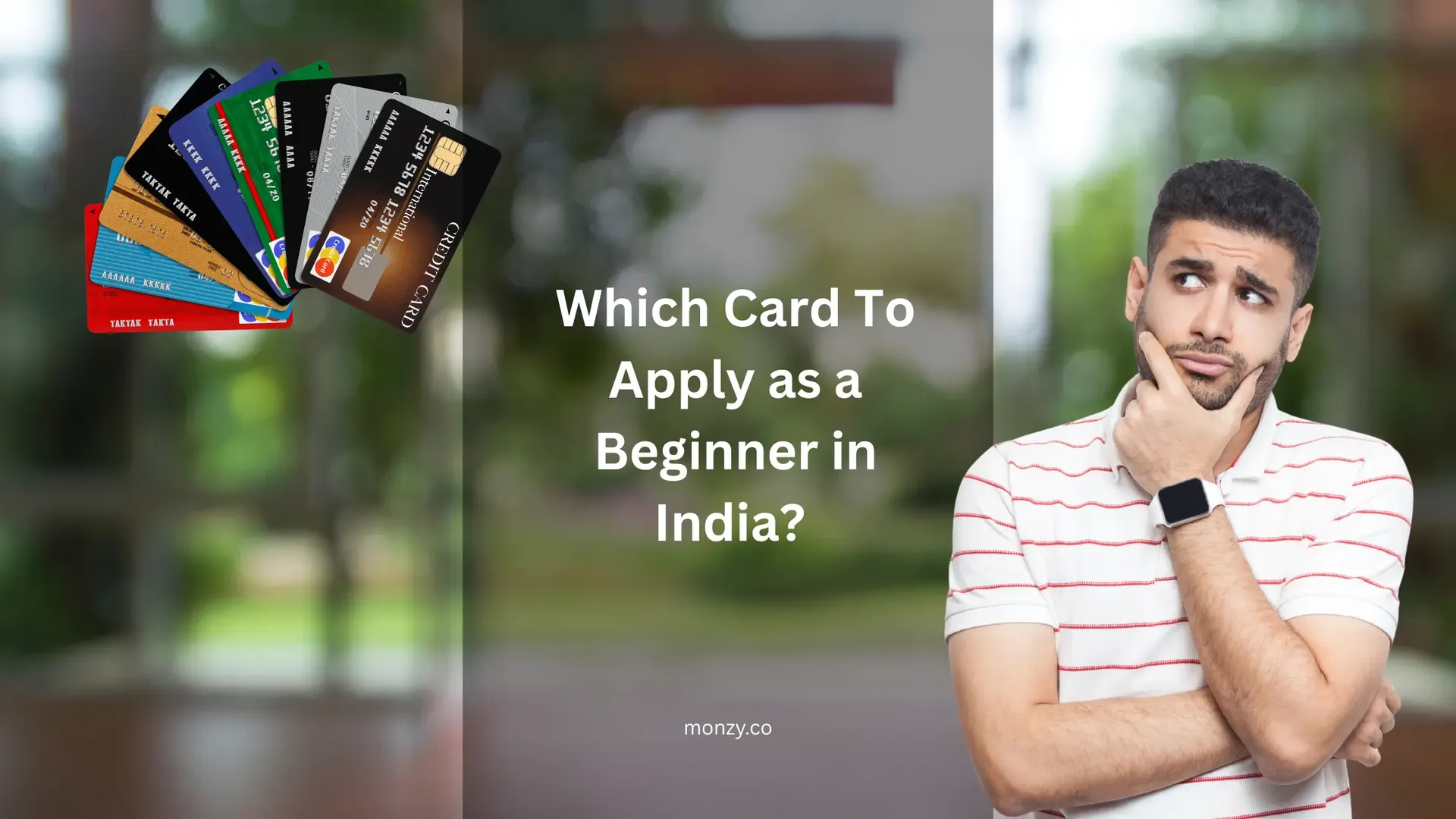5 Beginner Cards for First-time Credit Card Applicants
Last updated on
If you are applying for a credit card for the first time, this guide will show you how to improve your chances of approval and even help you find the best credit card as a beginner.

Table of Content
The first time I filled out a credit card application, I was just as clueless. I didn’t know what CIBIL meant, had no idea about annual fees, or what a credit limit was, and just hoped that I would get approved. Getting your first card can feel confusing, but it doesn’t have to be. Whether you are a student, freelancer, or someone who has just started a job and has no credit history, you can still qualify.
That’s why I wrote this blog for anyone considering having their first credit card to build their credit profile. Think of this as a handholding session with real insights that helped me get my first credit card against FD and start my journey to a strong credit score.
So, pay attention, because I will also share some of the top beginner cards like FD credit card options with the highest chances of approval.
The Not-So-Fun Part of First-Time Credit Card Applications (But You Should Know It)
Getting your first credit card feels like a grown-up milestone. But before you swipe, there are some hurdles to clear. Here are the common issues and how to solve them:
- “Your profile doesn’t meet our credit card eligibility criteria.”You might be too new to get approved for a card. If you are a student or just started working, many banks may hesitate.Solution: Start with secured credit cards or an FD credit card that uses a linked FD. These options help you build a profile and improve your future credit card limit.
- “No credit history or CIBIL score found.”No credit history means no CIBIL score, and banks get cautious.Solution: Apply for a credit card against FD or a fixed deposit account. This is one of the easiest ways to build a score and eventually access regular credit card offers.
- “I don’t want to fall into debt.”This is a common fear for beginners and completely valid.Solution: Always read terms carefully, especially about annual fees and statement cycles. Pay your bills in full, never just the minimum due, and watch your credit limit grow over time.
Remember, your first card isn’t about luxury perks, it’s about learning the game. Play it smart, and it’ll open doors you didn’t know existed.
Best Credit Cards for Beginners: Quick Comparison
Looking for a quick answer? Here’s a brief overview of what we feel are the best credit cards for you as a first-timer, according to our research.
Annual Fee (₹) | FD Required | Income Required | CIBIL Required | Best For | |
Kotak811 Dream Different | 0 | Yes (Minimum FD amount ₹10K) | No | No | Students with no income or freshers in their first job. |
IndusInd Platinum Aura Edge | 0 | No fixed deposit account | No | No | Freelancers or students wanting a lifetime free credit card |
ICICI Platinum Chip | 0 | Optional (₹20K) | ₹15K+ | No (if FD) | Students with an FD or first job holders. |
SBI Unnati | 0 | Yes (₹25K) | No (if FD) | No (if FD) | Students and first time card applicants |
Axis Bank Neo | 250 | No | ₹15K+ | Yes (650+) | First job holders seeking exclusive rewards. |
Top 5 Cards for First-Time Credit Card Users in 2025
When taking your first steps in the world of credit cards, skip looking for fancy cards and find the one that gets easily approved and helps you build a solid credit score without draining you with confusing terms and conditions. These five cards below do precisely that:
Kotak811 Dream Different Credit Card
- Issued by: Kotak Mahindra Bank
- Joining/Annual fee: ₹0 (Lifetime Free)
- Card Network: Rupay credit card (main variant)
- Category: Secured/lifetime free, rewards, fuel/railway surcharge waiver
- Income Eligibility: No fixed income required; issued against Fixed Deposit (FD), minimum FD ₹10,000
The Kotak 811 #DreamDifferent credit card against FD is one of the best FD credit card online options for freshers. It is a lifetime free secured credit card, issued against a minimum fixed deposit of ₹10,000.
This makes it highly accessible for those with no credit history or a low credit score. You can also earn reward points on spends and slowly grow your credit card limit over time.
Why Kotak811 Dream Different credit card as a first-time applicant?
- Strong fuel/railway benefits not found on other entry-level credit cards.
- No joining/renewal fees make it a highly attractive FD credit card.
- Great for credit building, first-time users.
IndusInd Platinum Aura Edge Credit Card
- Issued by: IndusInd Bank
- Joining / Annual Fee: ₹0 (Lifetime Free)
- Card Network: Visa
- Category: Lifestyle, rewards, shopping benefits
- Income Eligibility: Generally issued to salaried/self-employed individuals with a stable income proof
The IndusInd Platinum Aura Edge is a lifetime free credit card designed for everyday spending. It offers reward points on shopping, dining, and lifestyle spends, helping beginners slowly build a credit history and qualify for higher credit limits later.
Why IndusInd Platinum Aura Edge credit card as a first-time applicant?
- Lifetime free with no hidden charges or annual fee.
- Rewards on daily categories like shopping & dining.
- Simple, easy-to-understand terms with no complications.
ICICI Platinum Chip Credit Card
- Issued by: ICICI Bank
- Joining / Annual Fee: ₹0 (Lifetime Free)
- Card Network: Visa
- Category: Entry-level, secured/unsecured, chip-enabled for security
- Income Eligibility: Salaried or self-employed; also available as a credit card against FD of INR 50,000 as confirmed by some Reddit users.
The ICICI Platinum Chip is a secured credit card that is free for life and perfect for building credit history. It comes with an EMV chip, like all other cards, and is great for first-time users who want an entry level card with basic beneifts.
Why ICICI Platinum Chip Credit Card?
- Lifetime free with no joining or annual fee.
- FD-backed card option for those with no income proof.
- Ideal for building and maintaining a strong credit score.
SBI Unnati Credit Card
- Issued by: State Bank of India (SBI)
- Joining / Annual Fee: ₹0 (Free for 4 years)
- Card Network: Visa
- Category: Secured against FD, rewards, waiver benefits
- a No income proof required; issued against a minimum FD amount of ₹25,000
The SBI Unnati is among the most beginner-friendly secured credit cards, designed for first-time applicants. With no annual fee for four years, it is a safe, affordable way to build credit history and slowly increase your credit card limit.
Why SBI Unnati Credit Card?
- No annual fee for four years of card usage
- Easy approval with a credit card against fixed deposit issuance
- Perfect for building a credit score from scratchBacked by SBI’s wide network for easy international transactions
Axis Bank Neo Credit Card
- Issued by: Axis Bank
- Joining / Annual Fee: ₹250 (waived on spends)
- Card Network: Visa
- Category: Lifestyle, entertainment, shopping offers
- Income Eligibility: Salaried/self-employed with income proof
The Axis Bank Neo is a budget-friendly credit card designed for lifestyle and entertainment spends. It offers discounts on partner apps and helps first-time users build a credit history and gradually increase their credit limit.
Why Axis Bank Neo Credit Card?
- Low annual fee with a simple waiver condition.
- Shopping and entertainment discounts with exclusive rewards from partners.
- Helps save on everyday spending while growing your credit score.
Choosing the Right Credit Card As A Beginner
Your first credit card sets the tone for how you view credit for the rest of your life. Be careful when you apply for your first credit card, as this is about building trust, discipline, and a strong credit score early.
Here’s what to keep in mind:
- Go for easy approvals: If you have no CIBIL or credit history, choose a secured credit card or credit card against FD with minimum FD amount.
- Low or zero annual fees: Avoid paying high charges initially. A lifetime free credit card is the best beginner choice.
- Simple, everyday rewards: Look for cashback on groceries, food delivery, and online spends over premium travel perks.
- Transparency first: Check interest rates, statement cycle, and late fees upfront. Pick cards with no hidden charges.
- Compare benefits: When cards look similar, compare multiple credit cards and choose the one with better exclusive rewards (or gift vouchers on application), and a higher potential credit limit.
💡 Pro Tip: Never copy your friend’s card. Their income, credit card eligibility, and banking relationship may differ from yours. Always pick a card that fits your profile.
How to Apply & Get Approved for Your First Credit Card (Fast)?
If you want to get a credit card approval, here’s your cheat sheet as a beginner:
Step | What to Do |
1. Do Your Research | Pick beginner credit cards with low fees, easy credit card eligibility, and good reward points. |
2. Choose the Right Type | No income? Get a credit card against FD with minimum FD amount. Salaried? Pick secured credit cards with low interest rates. |
3. Apply Online | Use the bank’s site for an online credit card application with instant credit card approval for an FD credit card. |
4. Keep Your Docs Ready | PAN, Aadhaar, FD receipt, and income proof required help faster processing. |
5. Don’t Apply Everywhere | Too many credit card applications hurt credit score and future credit card limit upgrades. |
Remember to get one credit card first and use it well. Pay your dues on time. That’s your gateway to bigger, better offers for the future!
Why FD Credit Cards Are the Best First Choice?
- Earn interest on your FD amount. You continue to earn interest on your minimum fixed deposit, so your money keeps growing while you build your credit profile.
- Easy credit card eligibility even with no credit history. Most banks approve a credit card against FD instantly when you meet the minimum FD amount requirement, even with zero credit score.
- Builds your credit limit for future upgrades. Timely bill payments increase your credit card limit, making you eligible for premium cards, international transactions, and better rewards later.
- Works as a low-risk way to learn how credit card transactions and credit card bills function. It’s the safest way to understand credit card statements, manage bill payments, and even explore options like an add-on card for family members.
Important Documents to Have as a First-time Applicant
Apart from a bank account in the bank, you need a set of documents for applying for a credit card as a first timer. Here are the essential documents required:
- Fixed Deposit Slip
- Aadhar Card
- PAN Card
- Bank Statement
- Salary Slip (if available)
Some banks ask you to upload the documents online or do an at-home/in-branch KYC when applying for a FD-linked secure credit card. Do check with your bank branch before you apply.
Frequently Asked Questions (FAQs)
long-termCan I get a credit card without a job or income?
Yes, you can apply for a secured credit card by applying for it against a fixed deposit account with the bank.
Can I withdraw cash using a credit card?
It’s possible to withdraw cash from your credit card account, but it's not recommended. Cash withdrawals from a credit card attract high interest rates and extra charges.
What is a secured and unsecured credit card?
A secured credit card is linked to a fixed deposit. The bank gives you a credit card limit against it. An unsecured card is approved based on income proof and CIBIL score.
Can I upgrade or get better cards later?
After 6–12 months of using your credit card responsibly, you can request a higher credit card limit or apply for a card with a better credit card reward points structure for your lifestyle and spending habits.
Will getting a credit card put me into long-termavoid any late fees debt?
No, using a credit card won’t automatically put you in debt. Just use it wisely and never try to spend more than your salary/earnings. Pay your credit card balance before your billing cycle ends, and you'll avoid any late fees. Most people make the mistake of paying only the minimum amount due, which leads to interest charges and late payment fees.
About the Author

Sakshi Dubey
Sakshi loves to shop and uses credit cards to understand how she can minimize her spending and maximize rewards. She writes posts about credit card rewards, best cards for everyday spends, and guides on optimizing credit card usage.
